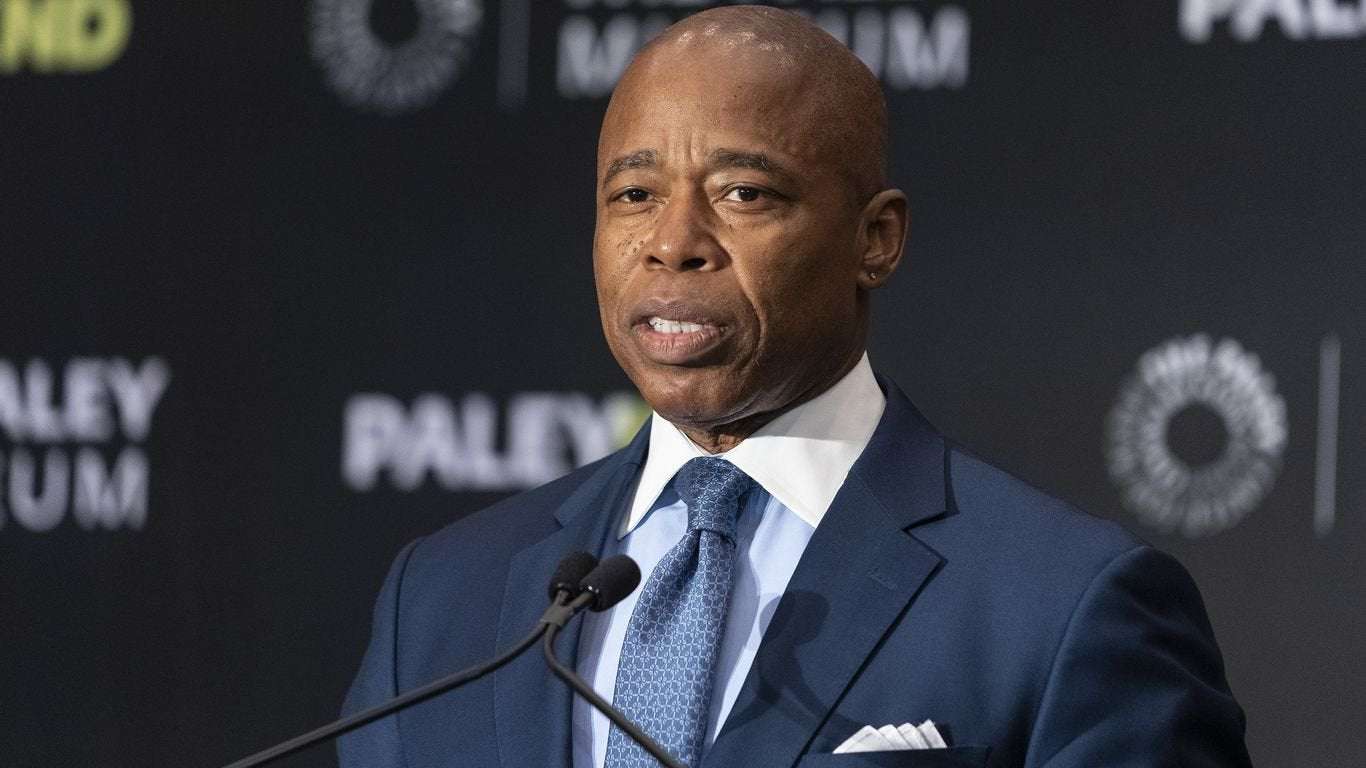Mayor Eric Adams speaks at The Paley Center for Media. Photo: Lev Radin/Pacific Press/LightRocket via Getty Images
New York City Mayor Eric Adams directed city officials Tuesday to begin hospitalizing more mentally ill people from the city's streets.
Why it matters: The move will include hospitalizing people from the subways and streets even if they aren't posing a risk to others, with the hope of finding hospitalized patients ongoing care before discharging them.
Driving the news: Adams said that New York City has “a moral obligation” to address “a crisis we see all around us.”
He called on city agencies, such as the police department, to remove people from the streets and subways and bring them to hospitals for extended care.
Training for police officers, Emergency Medical Services staff and medical personnel will begin soon to make sure officials show "compassionate care" toward others, Adams said.
What he said: "A common misunderstanding persists that we cannot provide involuntary assistance unless the person is violent, suicidal or presenting a risk of imminent harm," Adams said in a press conference.
"This myth must be put to rest. Going forward, we will make every effort to assist those who are suffering from mental illness and whose illness is endangering them by preventing them from meeting their basic human needs," he said.
"We will continue to do all we can to persuade those in need of help to accept services voluntarily," he added. "But we will not abandon them if those efforts cannot overcome the person’s unawareness of their own illness."
The big picture: Right now, homeless people who have mental illness will be brought to hospitals and then released days later when their condition improves, according to the New York Times.
But Adams said he wants hospitals to keep patients until they are in stable conditions and when there is a plan in place for new, ongoing care.
Cities' pandemic struggle to balance homelessness and public safety
Big cities call off 2021 homeless counts due to pandemic safety
Mayors feel powerless to reduce homelessness
The working homeless isn't just a tech bubble problem

SpectrumofMidnight on November 30th, 2022 at 16:25 UTC »
Right after I started my first job after college in my early 20s I had a mental breakdown and the onset of bipolar disorder. My mania went off the rails and in a short time I ruined my career. While I was in school and a controlled environment I was able to mask my mental illness. But once things got real and shit hit the fan in short order I just got triggered. I then got so brutally depressed I didn't work for almost 3 years.
I ended up in an iprt program [which is kind of like a school or a place you go to every day and do group therapy and learn stuff about your mental illness] with a place called FEGS which used to be a gigantic non profit organization in nyc which provided all kinds of mental health services in house. It heavily subsidized by the city and state. Thanks to them I was able to get treatment and therapy and group therapy and after about a year I was able to work again. Fast forward 13 years later and I am doing great. That said, it would not have happened without that place. And sadly that place doesn't exist anymore. And neither do most places like it.
And to show you a consequence of losing places like this, here's a quick story: There was this kid there in that iprt program with me. He was a late teenager. He had some kind of psychotic issue, maybe schizophrenia, maybe schizoaffective disorder. He didnt feel comfortable outside that place but he went every day, showed up, did all his stuff, was a great artist. He just couldnt function in real life. And some people are like that. Fast forward to new years eve of I'm gonna say, 2015 [I knew him back in 2009] and I had taken my mom to the er. And after a while the cops carry a big kid with a chunk of his cheek bitten off into the er. When I did a double take it was that kid. And by this time FEGS had closed in 2014. It really broke my heart that this kid was missing half his cheek and was cuffed to the bed surrounded by cops, god knows what happened. That would have never happened had FEGS been around. He was treated, he was peaceful. He just needed a place to thrive.
But I thought of the shitty mental health services and how much they have degraded and I am not shocked at the sheer amount of untreated mentally ill people out in the streets these days. Also, as I heard someone once say, the medicine for homelessness is a home, you would be shocked what you would do if you had to live on the streets. It is rough. NY Shelters are unsanitary and full of violent people. Very little policed. The mayor is just sweeping a much bigger problem under the rug. He just wants things to look nice. But you can't wear makeup over a dirty face. Economics are the major reason for this epidemic. The sheer amount of people that cannot afford rent is out of control. As rents go up so does the homeless population.
empty_spacer on November 30th, 2022 at 15:36 UTC »
I work in the psych emergency room at Bellevue. I’ll tell you right now we are short staffed as it is, and we really don’t have the beds to place this coming influx. This is just a bullshit PR scheme. they just get turned out again in three days.
Our mental health system needs a complete overhaul.
HappyFunNorm on November 30th, 2022 at 15:03 UTC »
I'm torn as to whether this is good or not, but SCOTUS has already ruled it's unconstitutional...
https://en.wikipedia.org/wiki/O%27Connor_v._Donaldson